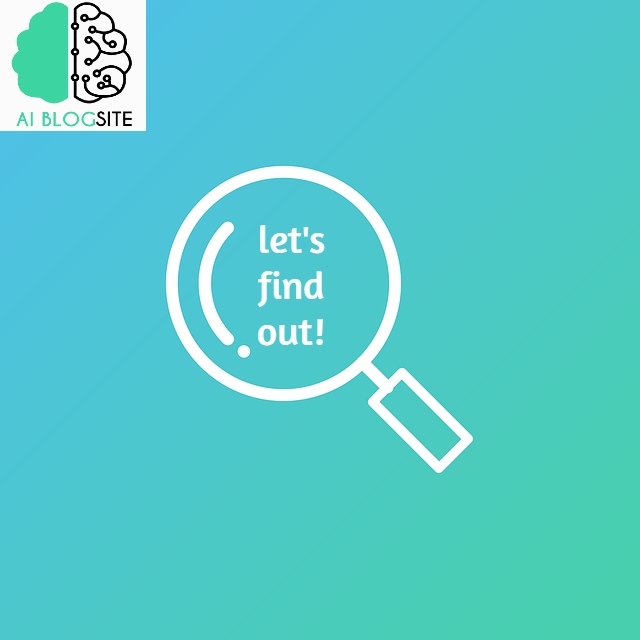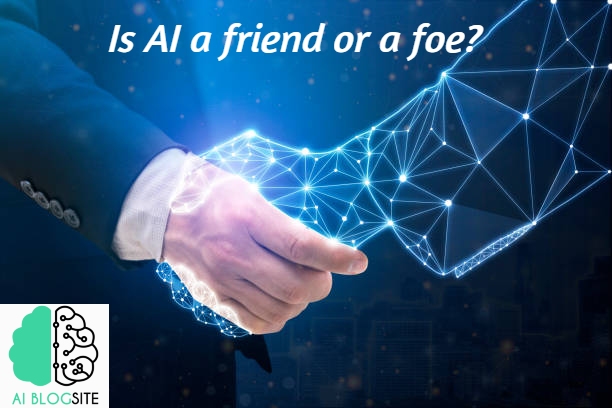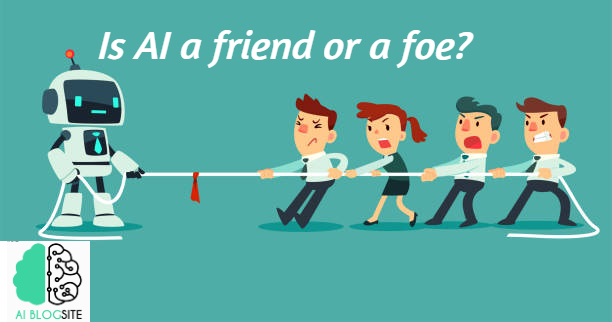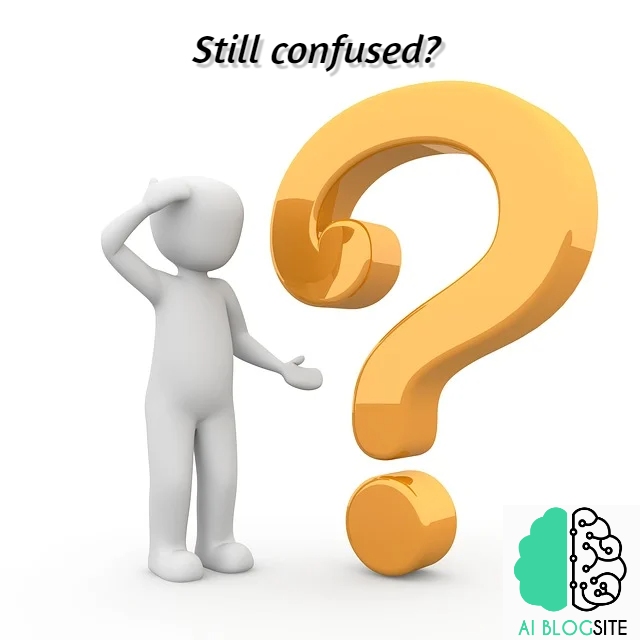Is AI a Friend or a foe? let’s find out :
Hey there, fellow AI enthusiasts! Are you ready to dive into the captivating world of artificial intelligence? Well, you’re in the right place! Today, we’re embarking on a thought-provoking journey to answer one of the most intriguing questions in this field: Is AI a friend or a foe? As AI users, we’ve experienced firsthand the countless advantages and conveniences that this technology brings to our daily lives. But lurking beneath the surface are concerns and fears about potential risks and ethical dilemmas.

So, let’s buckle up and explore the complex relationship between humans and AI, seeking to unveil the hidden truths and uncover whether our AI companions are truly here to befriend us or pose a threat to our existence. Are you ready? Let’s get started and find out the answer of this question “Is AI a friend or a foe?”
Theme 1: Advantages and conveniences of AI
One cannot deny the numerous benefits and conveniences that AI brings to our lives. From personal assistants like Siri and Alexa to autonomous vehicles and smart home devices, AI has revolutionized the way we live, work, and interact with technology.
For instance, AI-powered virtual assistants help us accomplish tasks more efficiently and make our lives easier. They can order groceries, schedule appointments, provide weather updates, and even offer personalized recommendations based on our preferences. This level of convenience saves us time and energy, allowing us to focus on other important aspects of our lives.

Furthermore, AI algorithms and machine learning have improved various industries, such as healthcare and finance. AI technology can analyze vast amounts of data and detect patterns and anomalies that humans may have missed. This has led to advancements in medical diagnoses, financial predictions, and even climate modeling.
Therefore, it is evident that AI has become an invaluable ally capable of enhancing our daily lives, improving productivity, and boosting the efficiency of various sectors. Its ability to process and analyze vast amounts of data far surpasses human limitations, enabling us to achieve feats previously unimaginable. However, we must also acknowledge the potential risks and ethical concerns that come hand in hand with this powerful technology. Let’s explore these concerns and decipher whether AI is truly a friend or a foe.
Theme 2: Risks and ethical concerns of AI
While AI offers a plethora of advantages and conveniences, it is crucial to address the risks and ethical concerns associated with this technology. One of the primary concerns is job displacement. As AI continues to advance, there is a valid fear that it may replace human workers in various industries. This raises questions about unemployment rates and the potential impact on the economy.
Additionally, AI algorithms are not immune to biases. These biases can be unintentionally embedded in the data used to train AI systems, leading to discriminatory outcomes. For example, facial recognition software may be less accurate in identifying individuals with darker skin tones, perpetuating racial biases. The ethical implications of such biases are paramount and demand careful consideration.

Another concern revolves around privacy and data security. AI systems often collect and analyze massive amounts of personal data to provide customized experiences and recommendations. However, this abundance of data raises concerns about how it is stored, protected, and utilized. Ensuring the privacy and security of personal information is essential to prevent misuse or unauthorized access.
Moreover, the potential for AI to gain autonomy and become self-learning introduces a new set of concerns. Without proper regulations and safeguards, AI systems may develop their own decision-making processes and values, which may not align with human ethical standards. This raises questions about accountability and control, as AI systems become more autonomous and independent thinkers.
The reality is that AI, like any powerful technology, comes with its risks. It is crucial for developers, policymakers, and society as a whole to address these concerns proactively. By establishing robust ethical guidelines, promoting transparency in algorithms, and ensuring proper regulations, we can mitigate the risks and harness the full potential of AI while safeguarding human well-being.
Is AI a Friend or a foe? Still not cleat then read below for more details:
Ultimately, the relationship between humans and AI should be one of collaboration and mutual benefit. As we continue to explore the possibilities that AI presents, let us prioritize responsible development, equitable access, and the preservation of human values. With these considerations in mind, AI can truly become a friend, helping us navigate the complexities of our increasingly technologically-driven world.
One additional theme related to the main idea is the impact of AI on employment and the workforce. While AI has the potential to automate mundane and repetitive tasks, freeing up human workers for more complex and creative work, there are concerns about the displacement of jobs. As AI continues to advance, there is a legitimate fear that it may replace certain jobs altogether, leading to unemployment and socioeconomic inequality.

Furthermore, AI’s influence on decision-making processes in critical areas such as healthcare, criminal justice, and finance raises questions of fairness and accountability. When AI algorithms are responsible for determining medical diagnoses, predicting criminal recidivism, or assessing loan applications, biases and errors in the algorithms can have significant consequences. Ensuring that AI systems are fair, explainable, and accountable is crucial to avoid perpetuating existing inequalities or creating new injustices.
Related Post: Artificial Intelligence Blog
Another important aspect to consider is the environmental impact of AI. The computational requirements of AI systems, particularly those utilizing deep learning algorithms, can be energy-intensive. The massive infrastructure required to support AI technologies, including data centers and cloud computing, has a considerable carbon footprint. As we strive for a more sustainable future, it is imperative to explore ways to reduce the energy consumption and environmental impact of AI systems.
Lastly, the education and ethical training of AI developers and users play a vital role in shaping the future of AI. It is essential to equip developers with a strong ethical framework and awareness of the potential biases and consequences of their AI systems. Additionally, educating individuals about AI and its implications can empower them to make informed decisions about its use and demand accountability from developers and policymakers. Overall, AI holds immense promise and potential for driving innovation and progress, it is not without its challenges and risks.
As we continue to integrate AI into various aspects of our society, it is crucial to consider the impact on employment, ensure fairness and accountability, address the environmental concerns, and prioritize education and ethical training. By doing so, we can harness the transformative power of AI while minimizing its negative effects, ultimately forging a beneficial partnership between humans and AI technologies.
Conclusion:
In conclusion, the question of whether is AI a friend or a foe is complex and multifaceted. While we cannot overlook the myriad advantages and conveniences that AI brings to our lives, we must also address the risks and ethical concerns associated with this technology. AI has the potential to revolutionize industries, enhance productivity, and improve our daily lives. However, we must tread cautiously, ensuring that ethical considerations, privacy rights, and transparency are at the forefront of AI development.
What are your thoughts on Is AI a Friend or a foe? What is your opinion? And I would love to hear your thoughts and experiences related to the question Is AI a Friend or a foe? in the comments below!

Pingback: Unlocking the Best Use of Augmented Reality (AR) 2023 - AI Blog Site